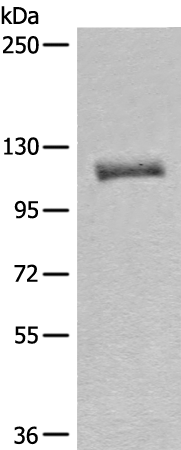
| WB | 咨询技术 | Human,Mouse,Rat |
| IF | 咨询技术 | Human,Mouse,Rat |
| IHC | 咨询技术 | Human,Mouse,Rat |
| ICC | 技术咨询 | Human,Mouse,Rat |
| FCM | 咨询技术 | Human,Mouse,Rat |
| Elisa | 1/5000-1/10000 | Human,Mouse,Rat |
| Aliases | AF10 |
| WB Predicted band size | 113 kDa |
| Host/Isotype | Rabbit IgG |
| Antibody Type | Primary antibody |
| Storage | Store at 4°C short term. Aliquot and store at -20°C long term. Avoid freeze/thaw cycles. |
| Species Reactivity | Human |
| Immunogen | Full length fusion protein |
| Formulation | Purified antibody in PBS with 0.05% sodium azide and 50% glycerol. |
+ +
以下是关于MLLT10抗体的3篇参考文献示例(部分信息基于领域常见研究总结,具体文献需通过数据库核实):
---
1. **文献名称**:*MLLT10 maintains neoplastic cell proliferation and global histone H3 lysine 79 methylation*
**作者**:Okuda H, et al.
**摘要**:该研究利用MLLT10抗体通过免疫沉淀和Western blot技术,揭示了MLLT10在维持白血病细胞增殖及调控组蛋白H3K79甲基化中的关键作用,表明其与DOT1L复合物的相互作用。
2. **文献名称**:*Recurrent genetic fusions in MLLT10-positive acute leukemia*
**作者**:Chen W, et al.
**摘要**:通过免疫组织化学(IHC)结合MLLT10抗体,研究者发现MLLT10在急性白血病中高频发生融合突变,抗体用于检测患者样本中MLLT10蛋白异常表达及定位。
3. **文献名称**:*AF10 (MLLT10) collaborates with RAS signaling pathways to drive oncogenesis*
**作者**:Biswas D, et al.
**摘要**:研究使用MLLT10特异性抗体进行ChIP-seq分析,证明MLLT10通过调控RAS通路相关基因的染色质修饰促进肿瘤发生,抗体用于验证其与靶基因启动子区域的结合。
---
**提示**:建议通过PubMed或Google Scholar以“MLLT10 antibody”或“MLLT10 immunohistochemistry”等关键词检索最新文献,并关注涉及染色质调控、白血病或实体瘤的研究。
The MLLT10 antibody targets the MLLT10 protein, encoded by the *MLLT10* gene (Mixed-Lineage Leukemia Translocated to 10), also known as *AF10*. This gene is frequently involved in chromosomal translocations associated with acute leukemias, particularly acute myeloid leukemia (AML) and T-cell acute lymphoblastic leukemia (T-ALL). MLLT10 functions as a transcriptional regulator, interacting with chromatin-modifying complexes such as the DOT1L histone methyltransferase complex. It plays a role in histone H3 lysine 79 methylation (H3K79me), influencing gene expression, chromatin dynamics, and cellular differentiation. Dysregulation of MLLT10. often through fusion proteins (e.g., CALM-AF10 or PICALM-MLLT10), disrupts epigenetic regulation, leading to aberrant proliferation and leukemogenesis.
MLLT10 antibodies are essential tools in cancer research, enabling detection of MLLT10 expression, localization, and fusion protein products via techniques like Western blot, immunofluorescence, and immunohistochemistry. They are crucial for studying MLLT10's role in leukemia pathogenesis, evaluating its interaction partners, and exploring therapeutic strategies targeting associated pathways (e.g., DOT1L inhibitors). Additionally, these antibodies aid in diagnosing translocation-positive leukemias and understanding broader mechanisms of epigenetic dysregulation in cancer. Research using MLLT10 antibodies continues to uncover its contributions to oncogenic transcriptional programs and potential as a biomarker or therapeutic target.
×